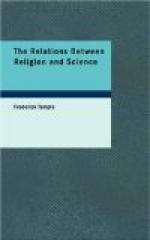The advocates of determinism urge that every action must have a motive, and that the man always acts on that motive which is the stronger. The first proposition may be granted at once. The freedom of the will is certainly not shown in acting without any motive at all. If there be any human action which appears to be without any motive, it is not in such action that we find human freedom. Such action, if possible at all, must inevitably be mechanical. A man who is acting from mere caprice is even more completely at the mercy of passing inclination than one who is acting from passion or from overpowering temptation. The freedom of the will is not shown in acting without motive, but in choosing between motives. But when it is further said that a man always acts from the stronger motive, the question immediately follows, what determines which is the stronger motive? It cannot be anything in the motives themselves, or all men would act alike in the same circumstances; and it is clear that they do not. It must be therefore something in the man. And if it be something in the man, it must be either his will acting at the moment, which in that case is free, or his character. But if it be his character, then follows the further question, what determines his character? If we are to maintain the uniformity of nature, we must answer by assigning the determination to the sum total of surrounding and preceding circumstances. Nothing will satisfy that law of uniformity but this; that, given such and such parents, such and such circumstances of birth and life, there must be such a character and no other. At what point is there room in this case for any responsibility? I did not on this supposition make my character; it was made for me; any one else born in my stead, and living in my stead, would of necessity have acted exactly as I have done; would have felt the same, and aimed at the same, and won the same moral victories, and suffered the same moral defeats. How can I be held responsible for what is the pure result of the circumstances in which I was born? But if, on the other hand, it be said that our character is not the mere fruit of our antecedents and surroundings, the law of uniformity is clearly broken. A new element has come into the world, namely, my character, which has not come out of the antecedents and surroundings according to any fixed law. The antecedents and surroundings might have been quite the same for any one else, and yet I should have my character and he his, and our lives would have altogether differed.




